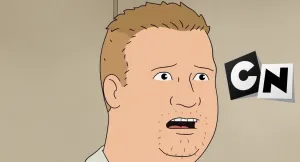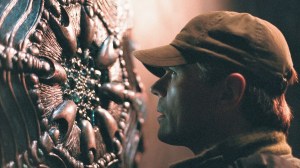Tonight, Marcus (Benjamin Wadsworth) leads a strike force that includes Saya (Lana Condor), Maria (Maria Gabriela de Faria), Petra (Taylor Hickson), Billy (Liam James), and Lex (Jack Gillett) against F-Face (Tom Stevens) and his army of inbred rednecks, in the season finale of Deadly Class, the SYFY series based on a comic book by Rick Remender and Wes Craig. The episode also features a subplot involving Master Lin’s family, and includes some choice bits from comedian and character actor Brian Posehn, who plays F-Face’s hostage/straight man, Dwight Shandy. While a second season is not yet ordered, it seems likely, given that the show has become a consistent and growing ratings success for SYFY.
Videos by ComicBook.com
Since Remender not only co-created (and wrote) the comics, but also serves as an executive producer and co-showrunner on the TV series, Deadly Class is truer to its comic book source material than just about any comic book show on the air; indeed, during our visit to the set last year, actors and other producers talked reverently about the comics, praising not only Remender and artist Wes Craig, but the colorists (Lee Loughridge and Jordan Boyd) and letterer Rus Wooton. Remender joined ComicBook.com to discuss tonight’s episode, titled “Sink With California,” which will close out the first season. Deadly Class airs on Wednesday nights at 10 p.m. ET/PT on SYFY.

Your audience has been growing throughout the season, and you are just now getting to the point in the comics where things get really unpredictable. It feels, honestly, a little bit like the early days of The Walking Dead. Do you ever think about that kind of comparison?
I mean, it’s difficult. I think that you can’t ever anticipate that, and if you try for that, then you’re going to pander, and you’re going to make sloppy art, and so all I can do is make sure that the creative is what I wanted it to be, and that I’m excited by the creative, and that it feels like it has an integrity, and that there’s no fat on the bone, and that the scenes are concise, and the characters are defined, and the dialogue is interesting, and the plot is unpredictable, and that there’s heart. If you do your work, the audience tends to come, is what I have found. That’s been throughout my career, on anything I’ve worked on, from creator-owned books to C-level stuff at Marvel, I found that if you pour everything into and make sure it’s your best work, that the audience, the people who read it, will make noise, and that noise will draw in other people, and then it’ll grow and grow.
So, in terms of looking at that stuff, of course I look at the numbers, and of course that determines if we’ll make more TV show, and so you can’t not be curious about it as you’re going through it, but I’ve never allowed myself to make decisions based on audience reaction or what I think people want, and I never allow the story to be changed out of fear of that. So, what’s nice is that you start to see that it is growing, and we’re the number one show in live plus seven. The last three, four weeks running, we’ve been at 300 plus percent growth out of the live viewership, and so that means people are hearing about it, they’re talking about it, and they’re coming to watch it. That’s very gratifying. It’s nice, because again, when you make the thing and you make the strange flavor of ice cream exactly the way you want to make it, you never can quite be entirely sure if the population’s going to want that ice cream.
I kind of want to talk about Chester. That piece of casting was really great, because he really does walk that line between being compelling and repulsive. How important was it to get F–kface right, since without him, this whole back half of the season is a lot dicier?
You could say that about so many of the various characters. We’ve been incredibly fortunate that the Russo brothers brought along their casting agent in Sarah Finn, and she has brought in a number of teams in LA and Vancouver to put together the options that we’ve landed on. It’s always been insane watching the audition tapes, because when we find the right person, they stand out like you’re blinded by a sun, and for Tom Stevens, who plays Chester, that was certainly the case. It is a complex character, and if you go too over the board with the evil, then it’s just arch and it’s just another boring bad guy. He has to have a strange humanity underneath all those layers of perversion. This is a guy you have to find a humanity in his bestiality, and it’s this over-the-top sort of insane task that Tom manages to do. This is a repulsive, twisted serial killer, who also has a beautiful singing voice, and has an aspect of his character that is a damaged human being that you feel sorry for. That’s a hell of a request, and boy, we just couldn’t’ve asked for somebody better than Tom. We got very, very lucky.
One of the things that has been unexpected in terms of a character with an emotional arc has been Lin, because obviously is probably the most different in the show from his comic book counterpart. Is there a reason that, in a series so true to the source material, a character that major has been the one who is radically changed?
It’s carefully-planned, in that basically if you get Benedict Wong, you have an A-level talent you want to write to, and so I had had a number of ideas that were on the back burner for Master Lin’s backstory, and some of those ideas where then workshopped with rest of the team, and turned into the current story for him in the TV show. What we’re seeing in this is some of the events that were sort of stitched together in my mind for who Master Lin is and how he got to be the person he is, but we’re watching these things happen and unfold in the course of the first season, and connecting it into the adventures that our heroes are having with the various bad folks and the cartel. That was carefully stitched together for a number of contextual reasons, and there’s a number of gets coming out the other side with Saya, and the crew, and the cartel that lead into a lot of season two.
It was a matter of taking those story elements and moving them forward, tying them into the narrative, and then giving Benny a much bigger story, that then feeds into a lot of his decision-making in season two.
I loved what Brian Posehn was doing this season. Was it helpful to have a guy like that, with his own presence and his own rhythm, for a role like that, so that it wasn’t just F–kface and his family of freaks?
I mean, for sure, and his family of freaks, all 10, should become sort of a red shirt army of hillbillies, and that’s fine. But what Brian gives you is, this poor pot dealer who was basically squatting after the party in Shabnam’s house, and ends up being kidnapped by a serial killer, and the serial killer must take some kind of a shine to him, because he keeps him as a sort of a pet, and so I love it, because I don’t think the first time you meet Dwight Shandy at the party that you predict that there’s a story there, and that this guy’s going to have a story. I think that you just anticipate that it’s just a funny little bit.
I like to make sure that anything that happens pays out, and that everything that is set up you get some kind of pay out with, and when you’re dealing with a 10-episode order, that’s one of the harder aspects, is taking what’s in the book. Sometimes we have what’s going to start and what’s going to pay out. In other cases, we’re setting things up that won’t pay out until season two in cases of some of the other aspects, like Dwight Shandy. I think episode by episode as you see him as this abuse victim and sort of navigating his captor that not only does Brian add a tremendous comic relief, but you have a human being there who’s constantly reminding you that Chester’s a monster, and that you feel sympathy for this poor captive. So it really pays out in a lot of different ways.
One of the things I talked about in my review of the pilot is that it’s easy for voiceover to become hacky, but you guys really make it work.
Obviously in the book it’s paramount, because I don’t have him revealing those things to the people around him. He’s a little bit more guarded than that, so if it’s done correctly, and the way I always try to approach it, is that you’re looking at one story, and being told one bit of information, and then the voice-over — or in the comics, the captions — are acting as a second story, as a different layer. It’s not telling you the story you’re watching, so you’re still following the show, don’t tell rule. You’re still showing one story, but the voice-over is then adding a layer of an additional bit of information you’re not getting from the picture.
I think when it’s done that way, it can add insight and, obviously, this is something that comes down to taste, but to me, once we found the right balance in the pilot and carried that through the series, I think you come out of it with a much deeper understanding of who Marcus is. There have been plenty of instances where he had voice-over in the book, and we did that for the show, and then it was too much, so we took it out. So it really is a case by case scene where you’re like okay, the voice-over really works here. Okay, the voice-over doesn’t work here. Okay. My emotions are being distracted here.
So, that’s something that I really played a lot with in the editing bay. In post, we spend months and months in there cutting these, and editing them, and stitching them all up. One of the things that took me the most time was getting the voice-over right, getting the right amount of it so that there was enough VO real estate that you still carried what was interesting about Marcus in the book and what made him Marcus and didn’t change those things to being dialogue, which is quite different, because what you write in a journal is much more honest than it would be in terms of talking to almost any human you know, so that was definitely a big challenge. I found that just leaving it in for the script, and we would record tons and tons of ADR and VO, and then once we’re in editing, I would go, “Keep that. Cut that.” Sometimes you hear a bunch, you can clip it. It was like Marcus when he’s running in last week’s episode, in episode nine when he’s running after waking up with Saya. In the book, there’s three times more VO there, but I went through and I just chose the sort of creamiest bits, the most necessary bits, and dropped it in there, and it works to a real wonderful effect.








